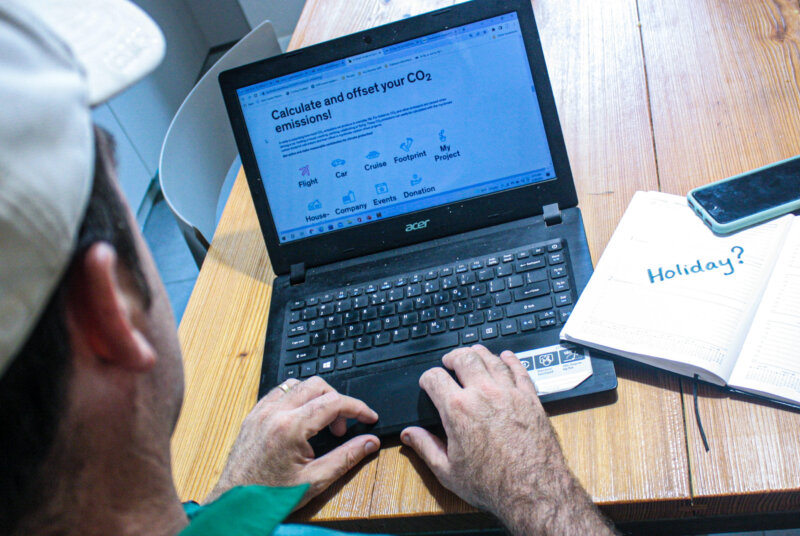Lifestyle, Sustainability, Words from Juliet Dale - The Great Eco Journey
To Offset OR Not To Offset? From Juliet at The Great Eco Journey
After a few years of (forced) staying-put, lots of us are considering spreading our wings again… wings of a plane that is. But with climate change an ever-increasing topic in our newspapers, conversations and minds, and with flying one of the biggest contributors to individuals’ carbon footprints, there is a certain degree of guilt involved in hitting the ‘book’ button when it comes to flights. But is offsetting our emissions a way to mitigate that guilt? What does ‘offsetting emissions’ even mean?

The term offsetting is a bit of a foggy one. By definition, it means calculating the emissions of an action (ie a flight) and then purchasing equivalent “credits” from projects that either prevent or remove the equivalent amount of emissions elsewhere. For example, your carbon offsetting could go towards funding the planting of forests, expanding renewable energy sources, converting waste to energy or even community projects like the Darfur Sudan Cookstove Project. This project replaced traditional cooking methods like burning wood and charcoal (usually inside the home), with low smoke stoves. In doing so the aim was to reduce indoor smoke as well as emissions. Community projects often have added non-environmental benefits, for example, this project also aims to empower women through employment, and less time spent collecting firewood and cooking.
In theory, it sounds ideal, right? But there are some downsides to offsetting. Firstly, the offsets don’t always deliver what they promise. Until relatively recently, the main form of offsetting was tree-planting. People felt good about the fact that they had funded the planting of 5 trees which would capture many tonnes of carbon. However, a newly-planted tree can take up to 20 years to capture the amount of CO2 that a carbon-offset scheme promises. Even if we spent 20 years planting (and then protecting!) acres of trees, we would still only offset a small fraction of global carbon emissions. And there is the added risk that the trees may not survive at all. They could be destroyed by droughts, wildfires, disease and deforestation. When a tree dies, it releases most of its carbon back into the atmosphere. We cannot tree-plant our way out of this climate crisis.
The second problem with offsetting is that most of us are misled by the term. We are led into the false sense of complacency that we have cancelled out the emissions of our flight, or whatever action/s we are offsetting. That’s just not the case. You are still causing carbon to be released into our already-fragile atmosphere. The aeroplane you are flying on is still producing just as many emissions as if you had not offset (and that is A LOT).
Which leads me to the last downside of carbon offsetting. They stop people from tackling the real problem, which is that we need to REDUCE our carbon emissions. While this is important for individuals, the bigger problem here lies with big corporations trying to build up their green credentials. Corporations who, by ticking some ‘offsetting boxes’, can claim to be sustainable while pumping out tonnes and tonnes of carbon into our precious planet.
Don’t get me wrong, offsetting is not a bad thing. Planting trees, expanding renewable energy, helping communities to be healthier and more sustainable… these are all GOOD THINGS. In fact, they are all VITAL THINGS. But they can’t be a substitute for reducing our emissions. They need to be something we do on top of that. Offsetting is the ambulance at the bottom of the cliff. Right now, our planet is in a bad way, and we need that ambulance. But, if you were in hospital with food poisoning, would you keep eating the food that had made you sick? We would be stupid to continue mindlessly repeating the actions that had led to the problem we find ourselves in.
So should you offset that flight? Yes, you should. But first of all, you need to consider if that flight is actually necessary. If it’s a work trip, could it be via video conferencing? Could you combine two trips into one? Are there ways that you could reduce the distance? Or reduce the emissions of your ticket by flying economy, travelling more lightly or flying direct. For more ideas on reducing the impact of your next trip, check out this blog on sustainable travel.
Offsetting will not solve the climate crisis. Our planet is still creating emissions at an alarming rate, faster than any offsetting scheme can counteract. If we are serious about tackling climate change, our first priority MUST be to reduce our own carbon footprint.
But that is something that cannot be done instantly, or (for the majority of us) entirely, particularly when it comes to travel. This is where offsetting plays an important role in getting out planet back on track.
Juliet is the founder of The Great Eco Journey. Follow the Great Eco Journey on Instagram & Facebook for more great tips and advice on reducing your carbon footprint and living sustainably.


